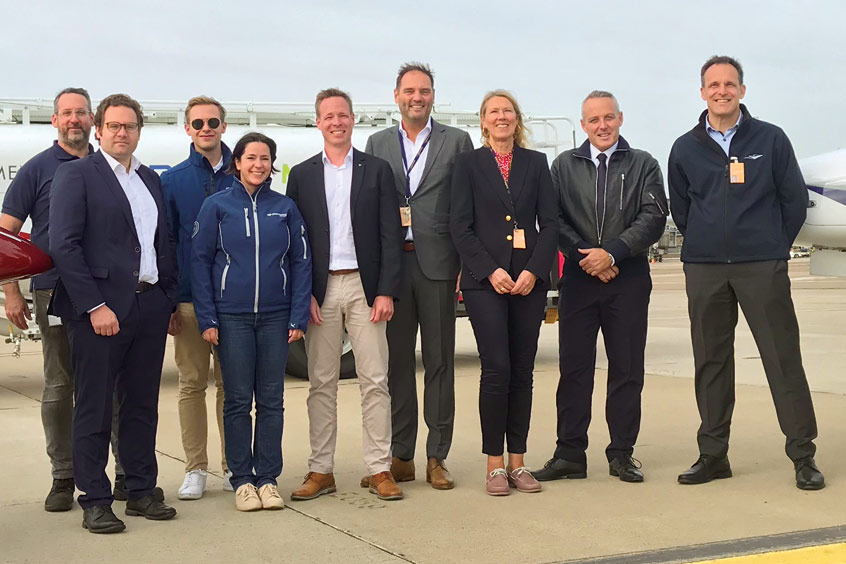 The monthly news publication for aviation professionals.
The monthly news publication for aviation professionals.



Following extensive tests and preparations, a training aircraft from the European Flight Academy made a first few circuits of the aerodrome at Bremen airport in Germany; the DA42-VI was fully fuelled with SAF.
The joint event, with representatives of Lufthansa Aviation Training, Diamond Aircraft Austria, Austro Engine, World Fuel Services and Bremen airport, was the kick off for extensive tests with blended SAF. Unblended neat SAF has been proven to generate up to 80 per cent less CO2 emissions than conventional kerosene. It is the goal of all involved parties to make the training of future Lufthansa Group pilots more sustainable and environmentally friendly as well. The results of this test series will reveal whether SAF can be used as the sole fuel for the European Flight Academy fleet in the future.
Eco-consciousness and responsible use of resources has always been at the core of Diamond Aircraft, who started with efficient, lead-free jet fuel engines and is moving forward with electrification as well as alternative fuels and propulsion systems. Diamond and Austro Engine anticipate increasing availability of ASTM D7566 SAF blends as a drop in fuel for general aviation in the coming years and plan to release the entire fleet for this fuel mix by the end of 2025. Significant market penetration of SAF is expected by 2030 and availability of 100 per cent pure SAF, without blending, for 2050.
Mathias Offen, head of training aircraft management, LAT Pilot Academy, says: “Today's test flight with SAF in one of our training aircraft is an essential building block on the way to sustainable pilot training at our flight schools, which we as the European Flight Academy are embarking on together with our training aircraft manufacturer Diamond."
Robert Kremnitzer, head of design organisation at Diamond adds: "SAF is the most immediately available key to reducing CO2 emissions in aviation. The majority of the Diamond fleet can benefit directly from using kerosene piston engines."
Felix Zahradnik, chief technology officer at Austro Engine says: "Despite the system-related advantage of a kerosene piston engine in terms of CO2 emissions, any further development towards overall CO2 reduction is of great importance to us. SAFs represent a welcome opportunity to immediately optimise existing fleets with respect to decarbonisation. These fuels have by now been sufficiently tested for use in turbines and their increased use saves tons of CO2. Kerosene-fuelled piston engines play only a minor role in aviation due to their low volumes globally and their low emissions in general. As a result, it was very difficult for us to procure these new fuels for analysis and testing, let alone to participate in their certification in order to address the specific requirements of a compression-ignition piston engine. However, by cooperating with LAT, one of our main customers, and with the great support of Bremen airport as well as WFS, we were able to procure enough fuel for extensive investigations on engine test benches and test flights in preparation for the certification of SAFs."
Commenting on the decision to provision sustainable aviation fuel (SAF), Bremen airport managing director as well as its COO and project manager Dr Marc Cezanne says: "As part of our climate protection strategy, we decided in 2018 to provide sustainable aviation fuel at Bremen airport. As a result, a tank farm for SAF as well as a reliable supply chain for the procurement of the more environmentally friendly kerosene were established. Since mid-2022, we have been offering 'green kerosene' to all airlines at our airport. We are very pleased that Lufthansa Aviation Training is now flying from Bremen with significantly reduced emissions."
Christian Knuschke, chief operating officer and project manager, Bremen airport adds: " We are currently able to store around 50 cubic metres of SAF at Bremen airport, but in the long run we aim at further developing our capacity in line with the market."
Matt Whitton, vice president, World Fuel Services notes: "Collaboration is key in accelerating SAF adoption, and we commend the dedication of all involved parties in making this project a success. The group's pioneering effort in SAF use aligns with our mission to expand SAF access and broaden the understanding that this is a drop-in fuel ready for use in any aviation application."